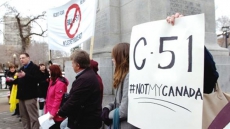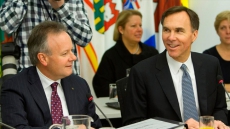VICTORIA — A group of British Columbia's green businesses wants Premier Christy Clark to lift the freeze on the carbon tax and return to annual increases, but an organization representing some of the province's top employers says the tax is high enough.
More than 130 businesses have signed a letter urging Clark to lift her government's four-year freeze on the carbon tax at $30 per tonne and introduce annual increases of $10 per tonne, starting in July 2018.
The open letter comes in the final days of a provincewide climate consultation process aimed at setting government goals to cut greenhouse gas emissions and boost the green economy.
"Close to one-third of B.C.'s carbon pollution is under the direct control of the province’s 170,000 small and medium-sized businesses, which employ more than one million people," says the letter, which was initiated by the Board of Change, Clean Energy BC, Climate Smart Businesses Inc., the Pembina Institute and Clean Energy Canada. "We are part of the solution when we work in energy efficient buildings, drive cleaner vehicles and reduce waste."
But Jock Finlayson, executive director of the Business Council of British Columbia, said Wednesday the province is already ahead of most jurisdictions.
"We don't favour a unilateral move by B.C. to further increase the carbon tax," he said. "We're already head and shoulders above anybody else in North America. We don't think it will actually be good for the economy to further widen the gap between carbon prices in B.C. and other jurisdictions."

Environment Minister Mary Polak said the carbon tax has proven to be effective at fighting pollution, but the government needs to examine the impact of raising the tax above $30 per tonne.
"We know it works, but what happens when it goes higher?" she said. "What does it do to our economy?"
B.C.'s Greenhouse Gas Reductions Targets Act calls for greenhouse gas emissions to be reduced by one-third below 2007 levels by 2020. The carbon tax amounts to almost seven cents per litre on the purchase of fuel and natural gas.
A report by the Climate Leadership Team appointed by the government says independent research found fuel use in B.C. dropped by 16 per cent since the implementation of the carbon tax, while it increased by three per cent in the rest of Canada. The report also says B.C.'s economy grew 9.2 per cent above the Canadian average from 2007 to 2013.
Matt Horne of the Pembina Institute, an environmental policy research group, said more than 68,000 British Columbians work in clean-economy jobs, an increase of more than 12 per cent between 2010 and 2014. Businesses that signed the letter to Clark include renewable energy companies, clean-technology innovators and outdoor recreation operators, he said.
Horne said if Clark approved the annual increases, the carbon tax would be $350 a tonne in 2050, the same year B.C. has targeted to cut its green house gas emissions to 80 per cent below 2007 levels.

"By the time you get to 2050, if we're successful, we're not going to have much carbon pollution left in the economy," he said. "It's a high rate, but if you are driving an electric car and you are living in a heat-pump powered house it doesn't really matter because you are not emitting carbon."




